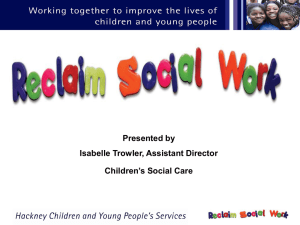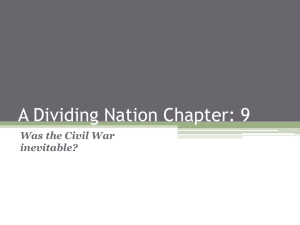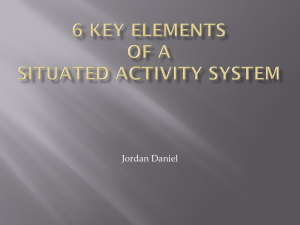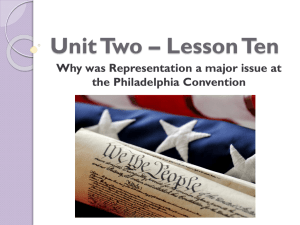I Statements & Conflict Resolution
advertisement
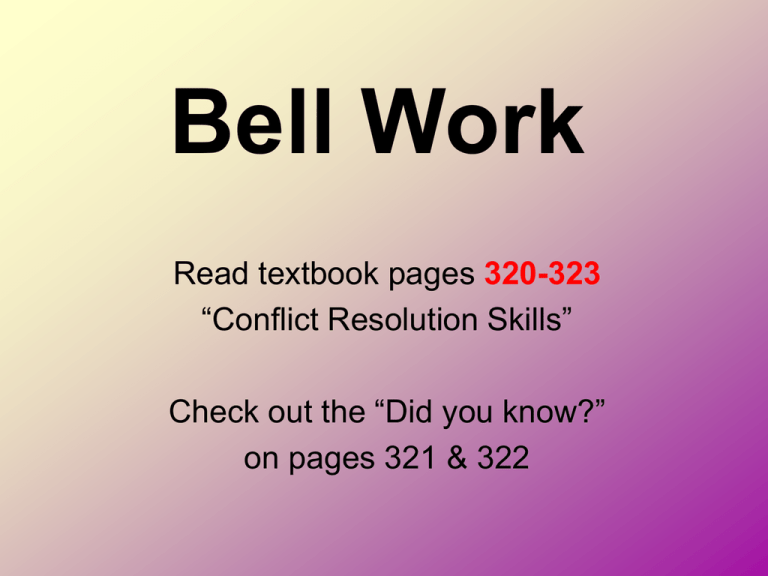
Bell Work Read textbook pages 320-323 “Conflict Resolution Skills” Check out the “Did you know?” on pages 321 & 322 Conflict Resolution Definition: The process of ending a conflict by cooperating and problem solving Objectives 1. Define tolerance. 2. Define negotiation. 3. Name & describe the 3 ways to handle a conflict. – Passive, aggressive & assertive 4. Explain why “I” statements are an effective way to communicate. Preventing Conflict • Tolerance – Accepting others’ differences & allowing them to be who they are without expressing disapproval TB 321 Solving a Conflict • Negotiation – Process in which compromising is used to reach agreement • Talking, listening, considering other person’s point of view, compromising • No blaming TB 322 Responding to Conflicts 1. Aggressive – Bully 2. Assertive – Leader • • High self esteem Admits mistakes 3. Passive – Follower • Low self esteem • “You” statements – Nothing solved – Have to get THEIR way • “I” statements – Best chance of resolution – Willing to compromise & say sorry • Little/nothing said – Nothing solved, give in – Never stick up for yourself TB 306-307 You idiot! Communication Skills I Statements How to use an I statement It is a verbal message! Identify feelings and situation Give an example solution (compromise) I feel ______________________ when ______________________ because ___________________. I’d like/I want _______________. Would you consider _________ ___________________________? Think about what the other person would want… put yourself in their shoes. EXAMPLE Parents won’t let you out past 10 I feel untrusted when I can’t go out after 10 because I’ve been well behaved. I’d like/I want to try and compromise. Would you consider letting me stay out until 11? How to avoid “you”… • When you keep bothering me Turn it into… • When I am distracted • Because you always make me Turn it into… • Because I’m made to Example Conflicts • • • • • • • • • Getting picked on by classmates or friends Seeing someone else get picked on Chores Computer usage Girl/boyfriend wants to spend every day with you Not allowed to go somewhere Clothes/hair Curfew Cell phone (bill…) Example Conflicts • A person is saying “you’re stupid.” • You witness a person telling someone they’re stupid • Your brother does not have to do as many chores as you do. • Your sister won’t let you on the computer. • Your girlfriend wants to spend every day with you. • You’re being picked on for being small. • Your parents will not let you go to a school dance. • You don’t like that a friend of yours keeps poking fun at you. • Your parents won’t let you wear certain clothes on the weekend or do your hair a certain way. Now you try… Your parents will not let go somewhere. Concert, dance, mall, friend’s house… I feel ______________ when ____________________________________ because _________________________________. I’d like/I want _____________________________. Would you consider ________________________ _______________________________________? What is the importance of each line in an I Statement? I feel Use a feeling word (upset, let down, sad, disappointed) when Explain the situation in detail & avoid “you” because Explain feelings and how it affects you (sympathy line) “it is important to me.” “it hurts my feelings.” I’d like/I want “to compromise.” “to fix our misunderstanding.” “talk about this tonight.” “be friends again.” Would you consider Ideas/solutions to fix the conflict. Be specific!! Both people must be okay with the suggestion. What is the importance of each line in an I Statement? I feel when because Use a feeling word (upset, let down, sad, disappointed) Explain the situation in detail & avoid “you” Explain feelings and how it affects you (sympathy line) “it is important to me.” “it hurts my feelings.” What is the importance of each line in an I Statement? I’d like/I want Would you consider “to compromise.” “to fix our misunderstanding.” “talk about this tonight.” “be friends again.” Ideas/solutions to fix the conflict. Be specific!! Both people must be okay with the suggestion. Important Elements Of An I Statement I feel identify a feeling (upset, sad, disappointed) when describe the situation in detail & avoid you because explain feelings to get their sympathy I’d like/I want ideas of what to say here: fix our misunderstanding, talk about this tonight, compromise, to be friends again… Would you consider an idea/solution/compromise to fix/improve the conflict. It must be specific & something both people would agree to. How to use an I statement It is a verbal message! Identify feelings and situation Give an example solution (compromise) I feel ______________________ when ______________________ because ___________________. I’d like/I want _______________. Would you consider _________ ___________________________? EXAMPLE Your friend is dating your Xgirl/boyfriend I feel angry when I see you with so-and-so because we spent lots of time together. I’d like/I want some time to heal. Would you consider waiting a few weeks to see each other? Why use I statements? hate violence you statements anger True/False 1. True False I statements prevent people from trying to guess why you are mad. 2. True False Tolerance is accepting others differences without expressing disapproval. 3. True False I statements should involve a compromise. 4. True False Passive people always have to get their way. 5. True False Negotiation is a method to prevent conflicts. 6. True False I Statements are always effective in solving conflicts. 7. True False Assertive people use a sincere tone of voice when discussion a conflict. 8. True False I statements are only shared with the friends of the person you are upset with. 9. True False You have no control over how the other person responds in a conflict situation. 10. True False A compromise is when both people are comfortable with a solution to a problem. 11. True False The word “you” is considered to be an assertive term. Your parents will not let you take the train to a mid-day concert in Chicago this weekend with your friends and two adults. You want to go and are going to try an “I statement” to resolve the conflict. 1. I feel angry When you won’t let me go to the concert Because I never get to go anywhere. I’d like/I want you to reconsider. Would you consider letting me go? 2. I feel disappointed When I couldn’t go to the concert in Chicago Because I’m responsible. I’d like/I want to compromise. Would you consider letting me go if I call you twice? 3. I feel left out When I am not able to go to the concert with my friends Because I know they’re going to have a good time. I’d like/I want to compromise. Would you consider letting me go if I am home by 10 pm? 4. I feel not trusted When I can’t go to the concert with 2 adults Because I can take care of myself. I’d like/I want to go to the concert. Would you consider letting me go to the concert? 1. In you’re opinion, which I statement is the best? Why? 2. Which statement is the most aggressive? Why? 3. Which statement(s) do not provide a solution or compromise? 4. In which statement does the person just keep repeating themselves? Will they always work? • No – You can’t control other people • But… – You’ve tried your best to resolve conflict in an assertive way – Helps your self-esteem • Feel good – Might make the person think more about situation – Didn’t escalate problem • Add to the fire

